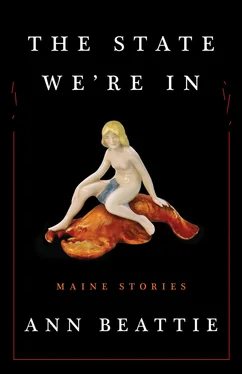We were doing acting exercises. Soars read his lines and at some point it was my job to interject something distracting, or to go into a fake coughing spasm, or even to say something hostile, such as “You miserable faggot, you’re no Edward, let alone Lear!” The thought was, anything could happen during a performance and the actor had to squelch his real-life reaction and keep going, without faltering. There was only one script, since it cost money to Xerox, so we sat close together. I tried to act, myself, to the extent that I didn’t want him to be able to anticipate one of my sneezes or outbursts, which I’d learned he could sense because of my breathing slightly altering in advance of speaking, or by my moving in even the smallest way, or by the minuscule noise my lips made when parting. My job was to zing him without warning. One time I actually threw myself off the chair and writhed like someone having a seizure. I’d deliberately worn long sleeves and jeans, so the damage was minor, but a delivery person wheeling seltzer cases into the brownstone next door stopped and ran to my assistance, and it was more than a little embarrassing when we had to explain.
I’m so sentimental. I can hardly believe there was such a time now. (I’m a doctor with a medical group in Portland, Maine; Soars is the divorced father of twins and an avid white-water rafter who leads trips for a tour company out west and writes articles about the outdoors and teaches at a community college.)
Here’s an obvious thing that I never thought about until recently: Soars and I weren’t just well suited to living together, we were so simpatico we morphed into an old married couple, in speeded-up time. For years, we were playacting the daily life of so many marriages, with my sudden, sometimes insane eruptions of temper, our long-standing joke about moving each other’s tchotchkes, with his constantly repeated lines (though his, ideally, came from Shakespeare).
While he was still in New York, he decided that except for his big crush on one guy, he wasn’t gay. He stopped dating men and began to hang out with me and my girlfriends, and then he began dating one of them, whose heart he broke, but that’s another story; even if he’s bi, time proved that he chose to marry women (he also had a second wife).
Anyway, as Soars and I were rehearsing that day, the red-haired lady stood up and cursed our dog friend, screaming, “Lucifer the devil! Luuuuuuucifer!” rushing poor, scared Major Maybe, who’d just lifted a leg to pee against his favorite tree in the tree box and was humiliated when he had to drop it midstream. She stretched out her arms and meant to topple Mr. Leavell, who simply turned sideways and let the wild tornado pass (Major Maybe, a peaceful fellow, had flattened himself on the ground), and so it did, twirling crazily from her little bare feet up her thick legs, her own long, pee-stained skirt tangling in a way that tripped her, so that when she continued her trajectory between parked cars, into Twentieth Street, howling that once the devil appeared there could be no redemption, the fabric was coiled around her like cotton candy. Then she was flung forward as if someone really had not enjoyed their treat. The cab screeched to a halt and the driver jumped out and bent over her like a referee giving the count, his finger scolding: woman down… until up she sprang, toppling a seminarian who, along with Mr. Leavell (who was in his sixties), rushed to pull her off the taxi driver, whom she was attempting to squeeze to death. Major Maybe was so humiliated that his jaw went flaccid, his leash having been tossed over one of the pointy spikes of the iron gate that enclosed the little cement area outside his home. The leash was too short for him to lie down without strangling, so he had to sit and watch the spectacle. He’d had an invigorating walk, lifted his leg for a few pees, and experienced some excellent sniffs — now this: an explosion from a street person sent our way by Fidel Castro, who’d released people from the mental hospitals and put them on ships and sent them here to mingle with our own. On good days she sang hymns in Spanish in a beautiful, clear soprano. She felt the breeze blow through her hair. She ate her saltines and did nothing to anyone. On bad days… well.
Where were the police? Where were the police? This was a time before cell phones. When the police arrived they handled the red-haired lady roughly, so much so that the seminarian took issue (it did no good). Her wrists were cuffed and her head was dunked into the police car like a basketball player sinking a one-handed shot. Easy. Nothing to it. Fast resumption of the game.
Our rehearsals were suspended. Mr. Leavell picked up his dog’s leash and marched up the steps into his house. Soars and I went upstairs and broke out the bottle of Italian white and sat in our director’s chairs for a while — they were cheap, and the only furniture. Neither of us thought about stealing the flower to our side. Which was a rubrum lily that day, dropping its pollen onto the floor beneath the window, a giant’s yellow dandruff. Outside, the wisteria vine was thick and green, curlicues and pointing witches’ fingers of pale green shoots that would continue to quickly unfurl, but it was no longer in bloom. We took a walk. We discussed our futures. We wondered if we were going to fail, just simply fail: if I’d never know what I wanted to do in life (I worked part-time as a waitress and my mother sent a check every month that paid more than my half of the rent). We wondered if AIDS would sweep through the city, if the red-haired lady had enough sanity to be scared at the police station, how long Major Maybe would live. Soars reached for my hand. We never held hands because, of course, we weren’t a couple. We laced our fingers, and I was astonished at how bony his hand felt, and that his palms were sweaty. Then we went back and fucked. We did what so many people do on someone else’s wedding day, or after someone else’s funeral, though in this case it was only on the day some street person got carted off to the police station. We had a good time doing it, but the only thing that changed was that for some reason, afterward, neither of us continued to play the game of Steal the Flower. I soon stopped buying them. I used the money to buy other little luxuries, like mascara. He continued dating my friend.
I met the man I married at a wedding I attended in Cape Neddick, Maine, in December (the bridesmaids carried white rabbit-fur muffs), though it took us eight years to get around to marrying. First I wasn’t sure about leaving New York City. Then I decided on medical school, but I wasn’t accepted anywhere in New York, so the decision about leaving was made for me. If you were in New York in the eighties, you wonder, now, where everybody went, and then you remind yourself that quite a few of them owned their property and dug in their heels, and eventually they — the people who made up a neighborhood — died. Some died of AIDS. Young people moved to Brooklyn. Or to the West, or to Atlanta. After 9/11, quite a lot of young people made an exodus from New York City to Portland, Maine, with its big waterfront buildings already being turned into artists’ studios and condos and ground-floor boutiques. Cool Portland, with its summertime tourists boarding boats and hoping to see a seal as they cruise out to one of the islands. Back on land, its time-warp hippies cross paths with people who live in brownstones and don’t have to think about money. There’s street art, and folding chairs are set up in music clubs. Used bookstores are still in business. If you’re a certain age, Portland more or less exists in ironic quotation marks (though of course no hipster would dare scratch them in the air).
Recently, on Airbnb, I saw my old apartment. There was even a picture taken out the window, where someone had pulled down enough of the vine to allow a view. They’d created a kitchen out of part of the hallway and what used to be the coat closet. It looked like the floor had been painted black, with an Oriental rug placed on it. The photographs were taken with a fish-eye lens because it was only a small apartment under the pitch of the roof, so you couldn’t even stand up beyond where the bed sat in the bedroom. But it’s all deception, right? You understand that the picture shows more space than exists. You fall for the vase of fresh flowers on the nightstand that in real life probably has the circumference of a pie pan. You know the neighborhood’s hip without reading the specifics: Galleries! Bookstores! Chelsea Piers!
Читать дальше












